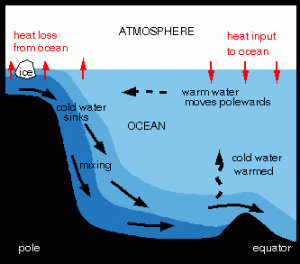Thermohaline circulation (THC)
Thermohaline circulation is deep-ocean, large, slow current; a type of circulation which is driven by differences in water density. Density depends on temperature and salinity. In polar regions ocean water gets very cold and the ice is formed. As a result the surrounding seawater gets saltier, because salt is left behind during freezing process. As the seawater gets saltier, its density increases, and it starts to sink. This pumping of surface water into the deep ocean forces the deep water to move horizontally until it can find an area where it can rise back to the surface and close the current loop.
Global warming can affect the THC in two ways: surface warming and surface freshening (water is less salty), both reducing the density of high-latitude surface waters and thus inhibiting deep water formation and layers mixing.
Image: Kristine DeLong, Louisiana State University, cleanet.org (CC: BY-NC-SA)



 This project (EDU-ARCTIC) has received funding from the European Union’s Horizon 2020 research and innovation programme under grant agreement No 710240. The content of the website is the sole responsibility of the Consortium and it does not represent the opinion of the European Commission, and the Commission is not responsible for any use that might be made of information contained.
This project (EDU-ARCTIC) has received funding from the European Union’s Horizon 2020 research and innovation programme under grant agreement No 710240. The content of the website is the sole responsibility of the Consortium and it does not represent the opinion of the European Commission, and the Commission is not responsible for any use that might be made of information contained.